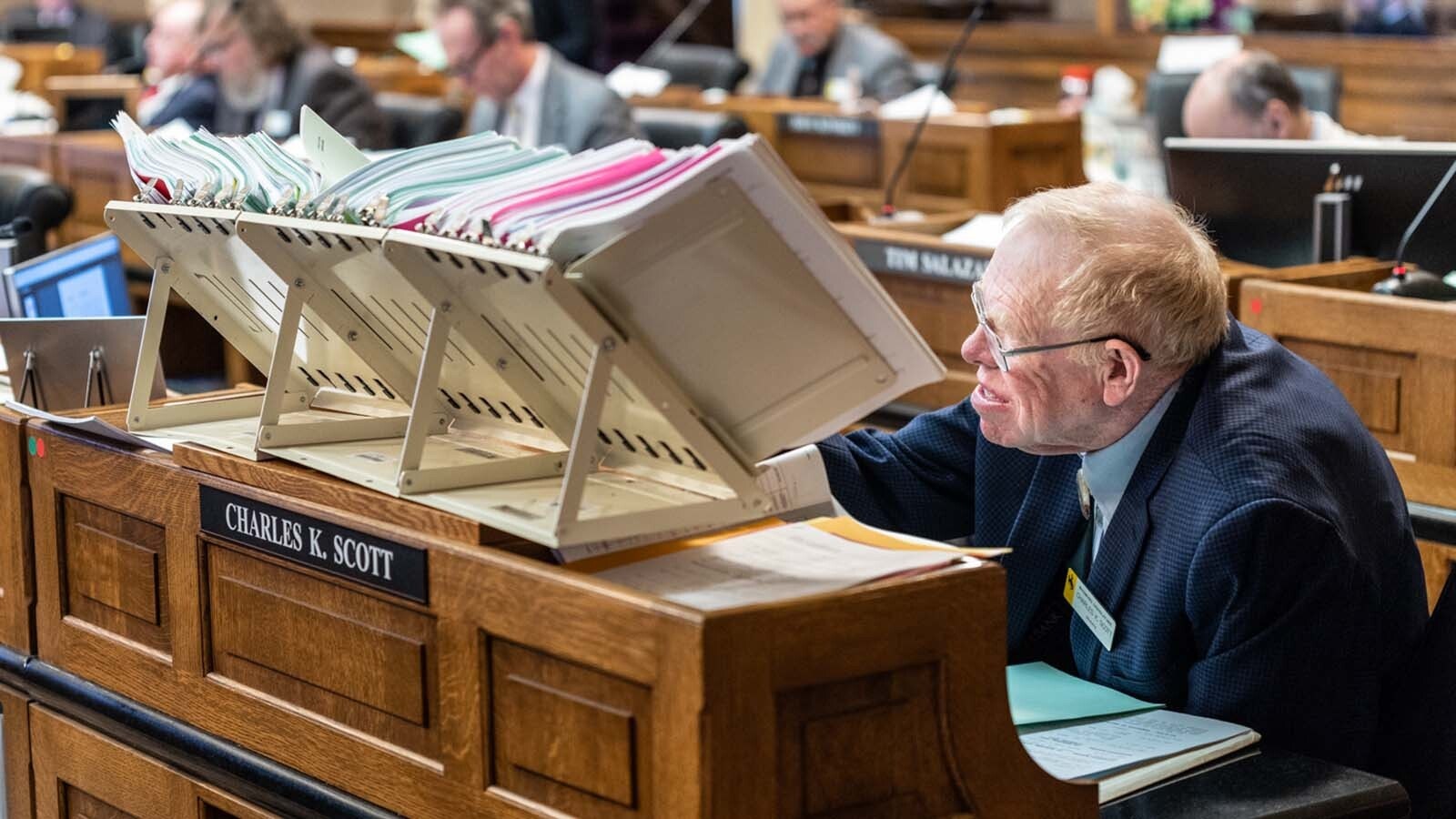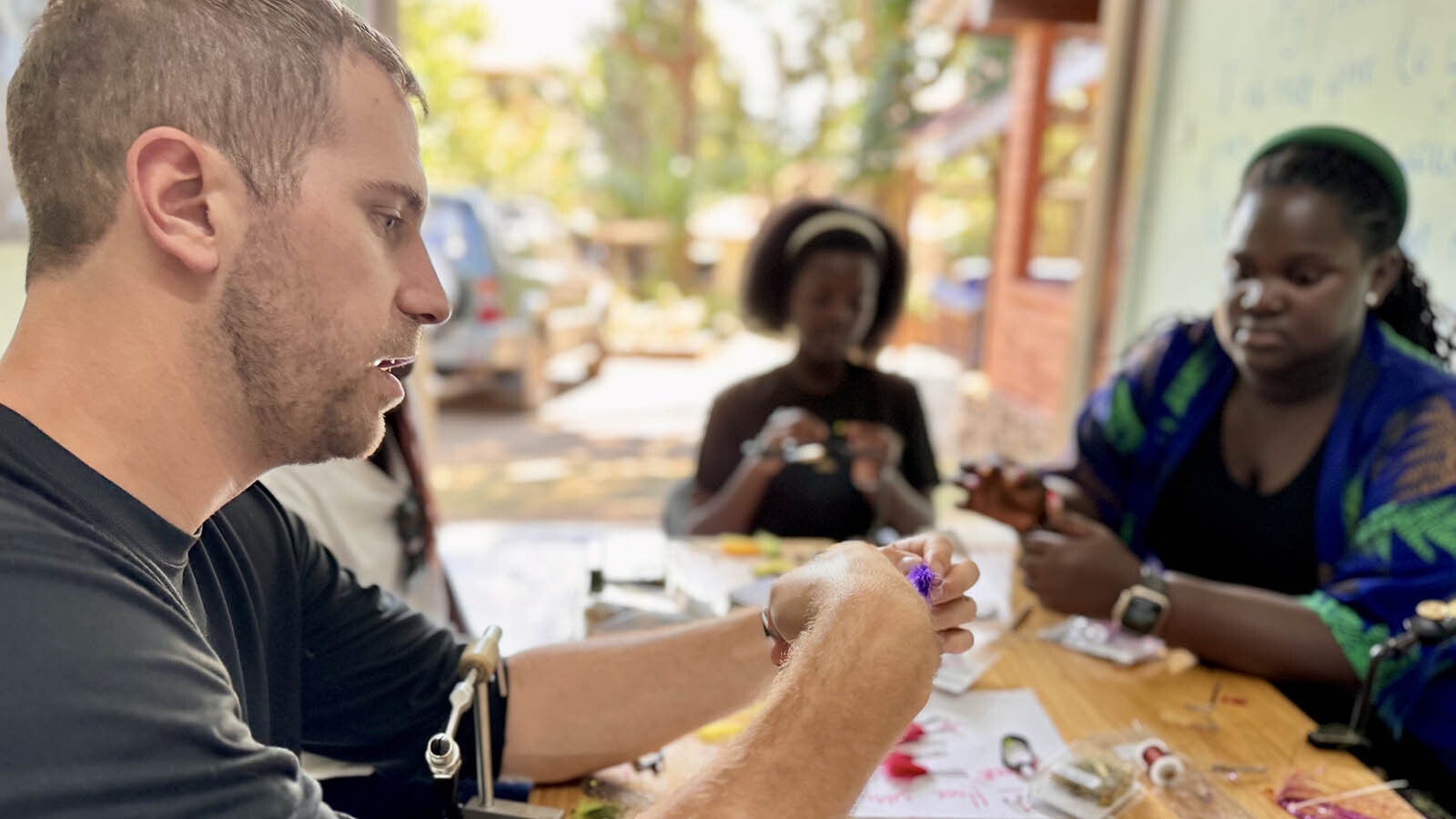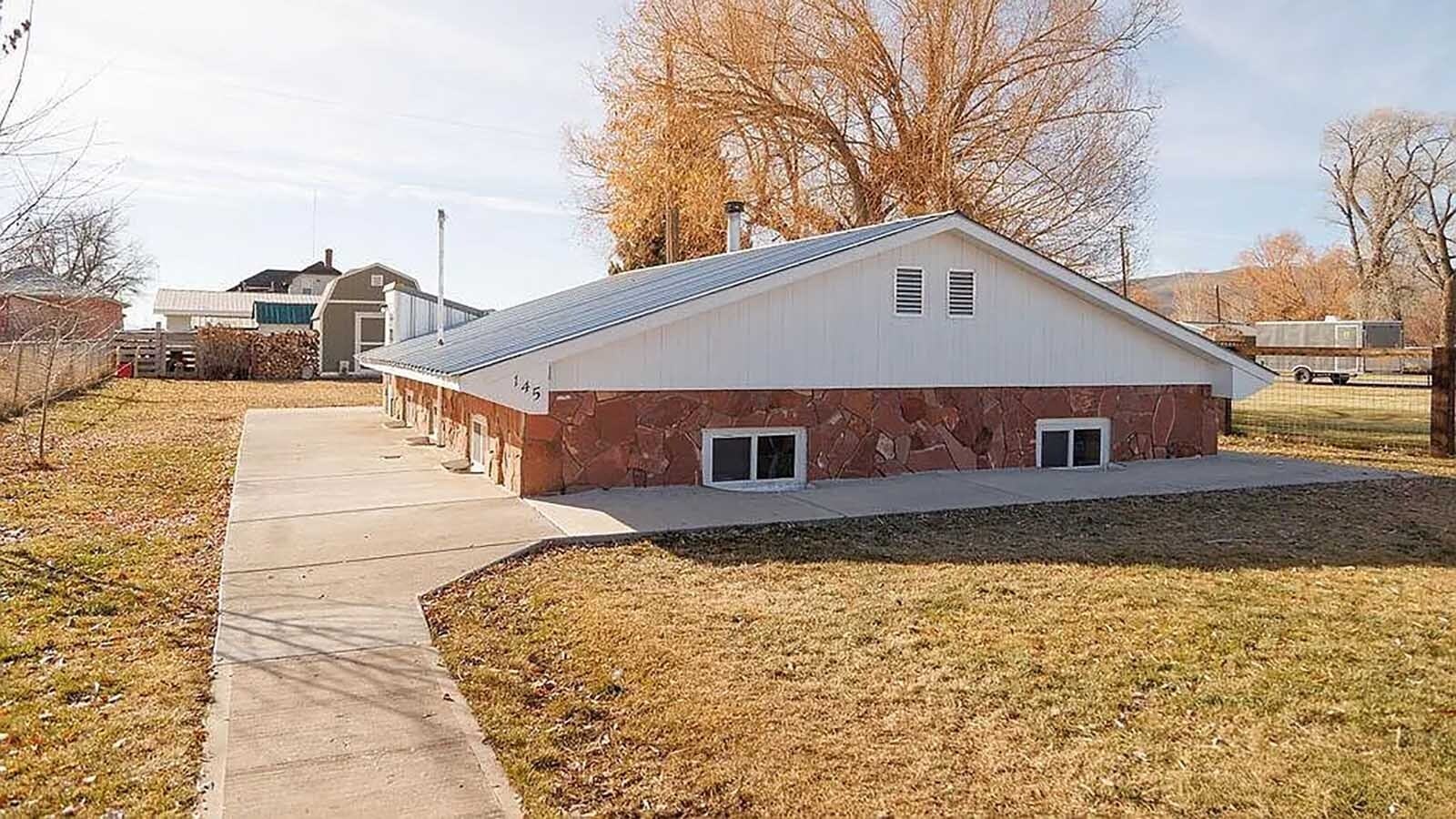When Charlie Scott began his nearly 45-year run in the Wyoming Legislature in 1979, Space Invaders was the most popular video game, “My Sharona” by The Knack was sitting at No. 1 on the Billboard music charts and Christopher Reeve had his career breakout moment as the title good guy “Superman” in the year’s top box office draw.
As the longest-serving lawmaker in the current 67th legislative session, Scott has been there for a lot of Wyoming’s growth and evolution.
Regardless of his longevity, though, he’s a figure who can’t be missed around the state Capitol.
For one, he’s tall.
But there’s more to it than that.
Scott is a little like Frank Sinatra – always doing things his own way.
That started early on, said Scott’s former colleague in the Legislature and now U.S. Sen. Cynthia Lummis, R-Wyoming.
Lummis and Scott both ran for state office in 1978.
“One of the things I remember about that is the state Republican Party brought some people out from the National Republican Party to try to teach candidates how to present themselves, how to dress and how to act,” Lummis told Cowboy State Daily. “And I remember that Charlie and I were both dressing and acting the way we still dress and act.”
The fixers tried to coax the two fledgling politicians out of that, but Lummis wasn’t giving up her hugs for handshakes, and Scott wasn’t giving up his plain, blunt manner of speaking.
Both were determined to be authentic long before authentic was a political buzz word.
“You can’t train the hugging out of people if you’re a hugger,” Lummis said. “And these days, if those same trainers came out to train us how to act, they’d say, ‘It’s important for you to be yourself and dress like you dress and act like you act. Don’t put on airs or anything.’”
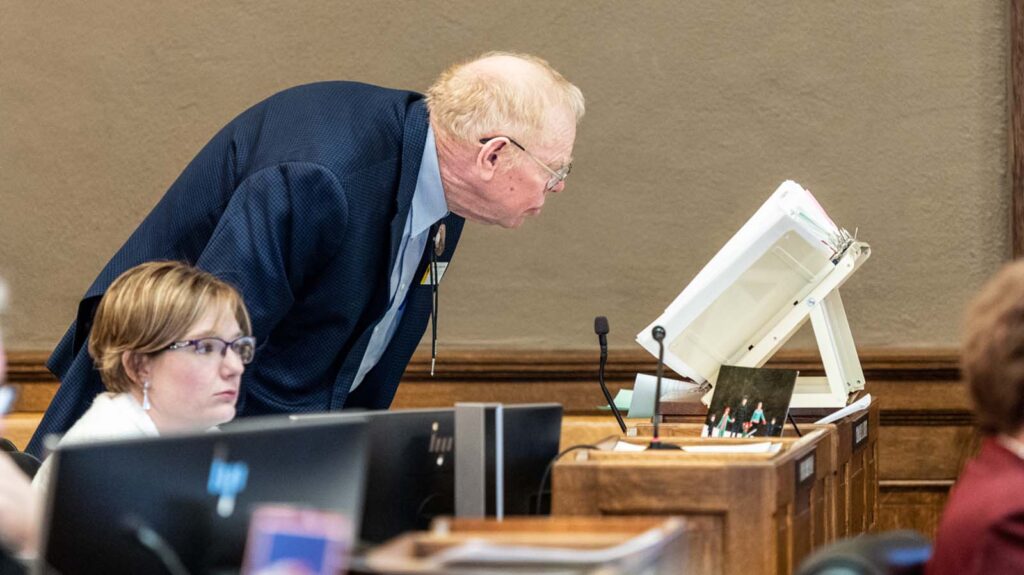



Charlie Scott, Unplugged
Scott is still doing things his own way on the legislative floor, and that’s immediately apparent. His is a curious system of notebooks spread across the top of his desk, the only one in the Senate that’s still totally unplugged.
There’s not a computer in sight – not that he doesn’t have one. He does, and he uses it.
For email.
The system of notebooks is a holdover from the Legislature’s pre-computer era, former lawmaker Bruce Hinchey told Cowboy State Daily.
“We used to have binders, and we’d put them in books,” he explained. “Then they put that system out, and we put each bill in that. So, you could just flip to the bill you wanted.”
Not long after that system came out, though, computers arrived. Most legislators adopted them.
Not Charlie.
“It works for me, because I’m quite tall,” Scott told Cowboy State Daily. “I can stand up and read from that and talk. Somebody who is a little shorter has problems, but I found it a very efficient system, so I’m the one that kept it.”
Bills are inserted in numerical order, which makes them quick and easy to find. Scott marks on the bills sometimes when they’re being read.
Once he’s done, the amended or notated bill goes right back into the binder system, ready if it should be needed again.
“It’s a very useful, efficient system,” Scott said.
Art Of Compromise
On the Senate floor, while colleagues are talking, Scott is intently listening. At the same time, he’s also rifling through his abacus-style system to get exactly the bill he wants.
Within seconds he’s found it and is back to standing tall, waiting patiently for a turn to speak. His comments, when it’s finally his turn, reflect that Scott’s done his homework — whether one agrees with his opinion or not — and that he has a thorough understanding both of Wyoming law and the bill at hand.
He also clearly knows not just what he wants to say, but what his colleagues are likely to hear.
“He has a good track record on his bills because he does his homework and sponsors things that usually are needed,” Hinchey said. “He makes sure that he’s crossed his t’s and dotted his i’s so that everything is ready to go whenever he gets there.
“He’s also learned the art of compromise like any good legislator, to know that if you want to get the bill, there’s always some times that somebody’s got a good idea that can be added to it, and you should let that happen, rather than just say no, it’s my way or the highway. That’s how you get things done.”
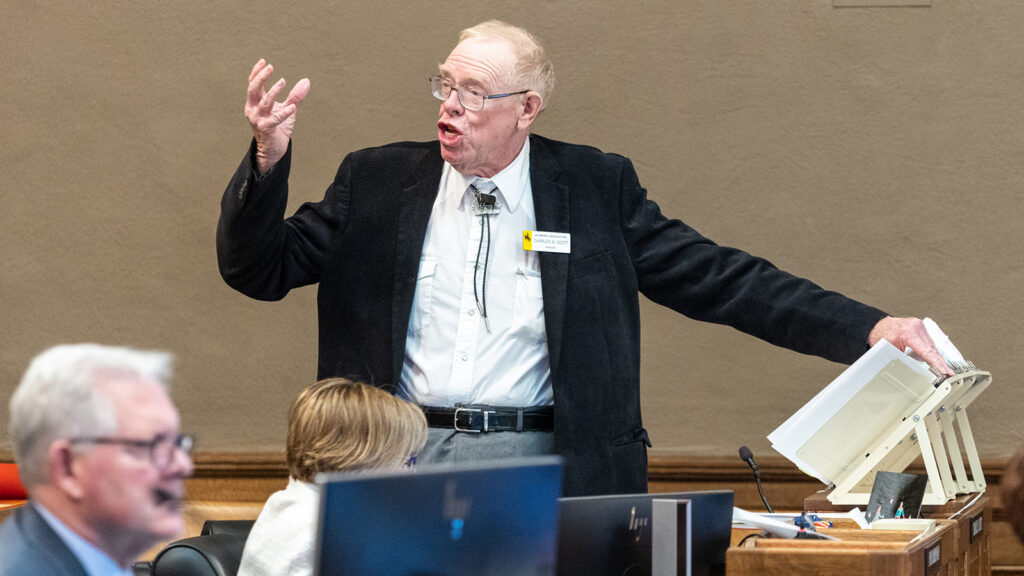
A Mentor
Medical and health care issues are among the areas where Scott’s fellow lawmakers said the legislator has been a tremendous help to them.
“When I was trying to navigate legislation like Obamacare, I can remember calling Charlie and asking him for his advice about how Wyoming would fare under Obamacare,” Lummis said.
Wyoming’s status as a frontier state, with low population density, did not bode well for the Cowboy State under Obamacare, Lummis recalls Scott telling her.
“And it has worked out that way,” she added. “When I was running for the U.S. Senate, I met a veterinarian in Wheatland whose health insurance as a sole practitioner was double the cost of a veterinarian sole practitioner in Sterling, Colorado. That is a consequence of Wyoming’s very small population. (Obamacare) is just a sheer numbers game, and Charlie just knew that – that it would be the consequence for Wyoming of Obamacare. He was 100% right on.”
Jack Of All Trades
But that’s not Scott’s only area of expertise. The Harvard MBA graduate also has a firm grasp on business, ranching and education, former Speaker of the House Russ Donley told Cowboy State Daily.
“He’s very thorough,” he said. “And because of that, he’s gotten a lot of really good things accomplished.”
Donley had particular praise for his recent efforts in the education sector with respect to charter schools.
Scott co-sponsored a bill that improved Wyoming’s charter law, Donley said.
“That (bill) just wouldn’t have happened without Senator Scott doing a tremendous amount of work,” Donley said. “So that’s a very big accomplishment.”
Scott also is a well-known rancher in the Casper region, Donley added.
“You just can pick almost any field, and he’s very knowledgeable,” he said.
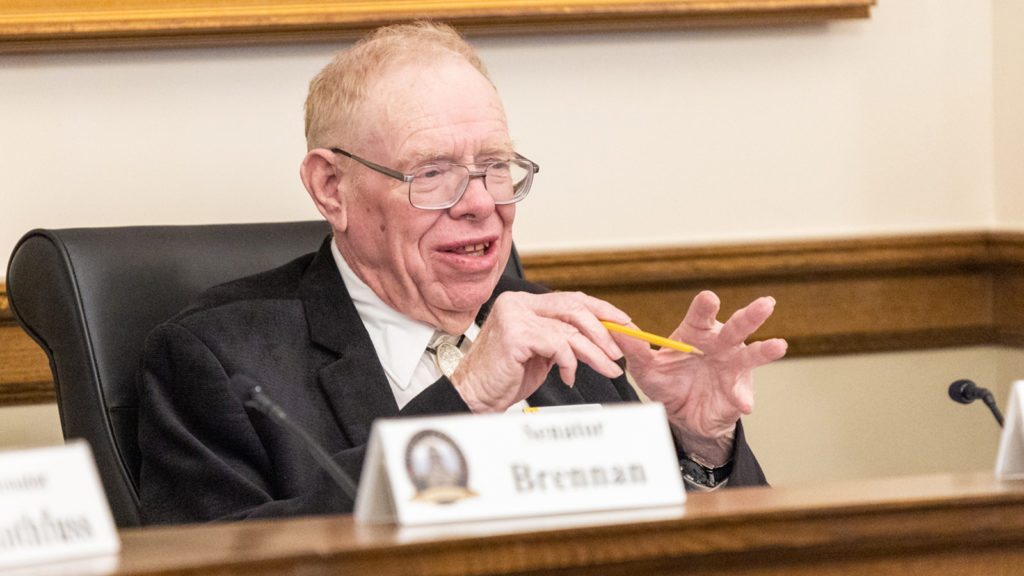
Top Priority
Education, in fact, was one of Scott’s top three concerns when he entered this 2023 legislative session.
“We’re trying to improve the quality of our public education,” Scott said. “The consultants the state hired said that kids who test proficient or advanced categories, they’re fine. They’re going to do well in the rest of school They do well in the rest of life.”
But the remaining students don’t do so well, and they number about 45% of Wyoming’s students, Scott said.
“Forty-five percent of the kids being left behind is a disgrace,” Scott said. “We need to fix that.”
Scott said he found the amount of money spent per pupil wasn’t correlating well with results in Wyoming.
“The more we’re spending, the worse results we’re getting,” he said.
Some of that could be an artifact in the way the funding is being measured, Scott said, but he believes some of it is because school districts are top-heavy.
“We’re buying too many administrators who are interfering with classroom teachers,” he said.
Because of that, Scott had sponsored a bill — which is so far in the speaker’s drawer — that tries to separate funding for teachers from the rest of the education block grant, so it cannot be spent on other priorities.
Other Priorities
Another bill that’s been in the speaker’s drawer is one that seeks to outlaw child sex change operations.
“Kids just don’t understand what they’re getting in for,” Scott said. “A lot of kids, when they reach puberty get confused over sexual and gender identity. That’s very common. And almost all of them grow out of it.”
Scott said he feels the decision should wait until an individual is an adult since the surgery isn’t reversible.
“It passed the Senate with a good vote,” Scott said.
But the speaker hasn’t referred it to committee. Scott doesn’t believe that one’s going to escape the speaker’s drawer this session.
His other big bill this legislative session is a carbon capture bill that seeks to force a power plant in Glenrock to retrofit its plant for carbon capture so the carbon dioxide can be used for enhanced oil recovery at a nearby oil field.
Scott sees it as a win-win. Not only will it help preserve a coal plant for future grid reliability, but it could make Wyoming barrels of oil net carbon neutral, or even negative, creating a future for both the state’s oil and coal.
“If we pass that bill, it’s worth $1.2 billion to state and local government in existing taxes and royalties,” Scott said. “That’s a 20-year projection at $65 barrels oil.”
That bill is the one that’s escaped the Speaker’s drawer, and Scott is hopeful it’s going to pass.
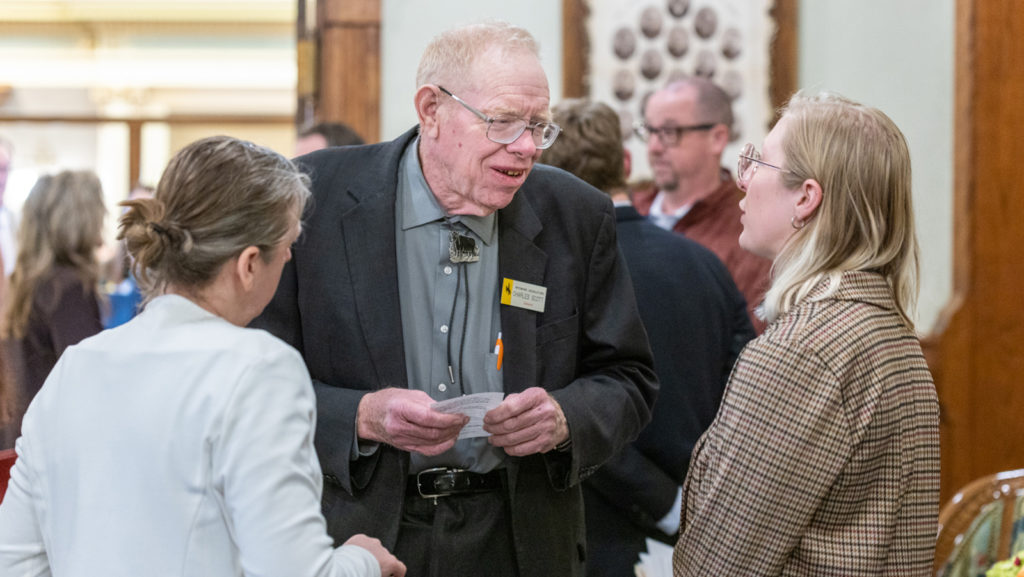
A Book About It
Scott told Cowboy State Daily he doesn’t know how many more years he plans to continue as a state lawmaker.
“It’s starting to, my age is starting to wear on me,” he said. “I’ll be up for re-election in 2024. I’ll have to decide if I’m going for another term. If it starts harming my health too much, I’ll say no.”
In the meantime, though, Scott is working on a book about his 45 years as a lawmaker. It’s going to be a collection of stories that focus on the “interesting” bits.
“That will be much better than some dry, academic thing,” he said.
He’s going to title it “Russ Zimmer’s Truck,” a classic legislative story with a lesson behind it.
At the time, the state’s agriculture department had the job of testing large scales used to sell things. They had put a $50,000 budget request in for the truck, but the appropriations committee had said no.
The department went to Zimmer, who was chair of their committee, and pleaded with him to bring an amendment that would put their funding for the truck back.
Zimmer thought he had all the votes he needed to get the amendment passed, but there was someone watching and waiting who knew something Zimmer didn’t.
“Jerry Geis, who sat in the back row there, and he’d been president of the Senate before, and he got up and said, ‘Now look,’” Scott recalled. “’Those of us that are in this business, when we have the troubles they’re having we don’t get a new truck. We overhaul the old one. It’ll cost you $5,000, which is in the budget. That’s all you need.’”
Zimmer’s amendment went down 29-1 on a roll call vote.
“He was pretty good-natured about it,” Scott recalled. “He was pretty good-natured anyhow. But that is a classic legislative story, because it happens to almost everybody who tries to do things here. We’re always operating with less than perfect information.
“And every now and then somebody didn’t tell you quite the whole story and somebody on the floor knows the whole story. And down you go in public. We get to make our mistakes in public.”

